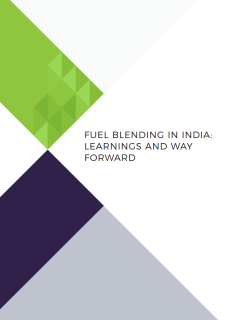
Biofuels have received global attention recently as governments across the world seek to address fuel efficiency, air quality and energy security. Biofuels are produced from renewable biological sources and are considered viable alternatives or supplements to fossil fuels. In order to support a broader shift towards biofuels, governments have introduced various policy measures; some of these include mandatory fuel blending programs, incentives for flex-fuel vehicles and agricultural subsidies for farmers. The Government of India in January 2003 launched its Ethanol Blended Petrol (EBP) Programme for 5% ethanol blended petrol. India’s EBP Programme sought to improve fuel efficiency and ensure protection from the price shocks of the global crude market. In 2009, the Government of India introduced a National Policy on Biofuels. The Policy focussed on further encouraging biofuel usage and reducing the prevailing dependence on fossil fuels, while it sought to mitigate environmental and fuel efficiency concerns. The Policy also recognised the significant opportunity that biofuels offer to India’s agricultural and industrial sectors.
This paper, therefore, envisages that achieving blending rate targets must only be the first step in a broader shift towards an economy based on biofuels. For such a shift, it would be important to see India’s National Policy on Biofuels and the EBP Programme in the broader context of India’s public policy priorities.
